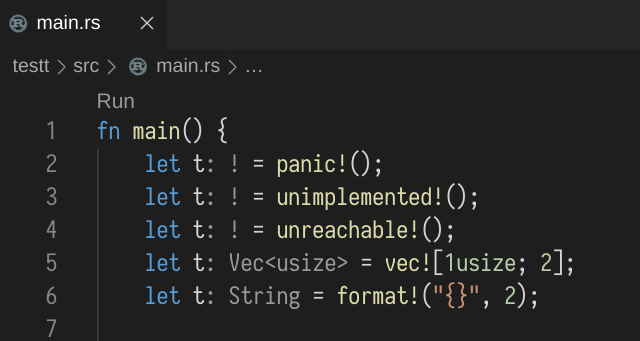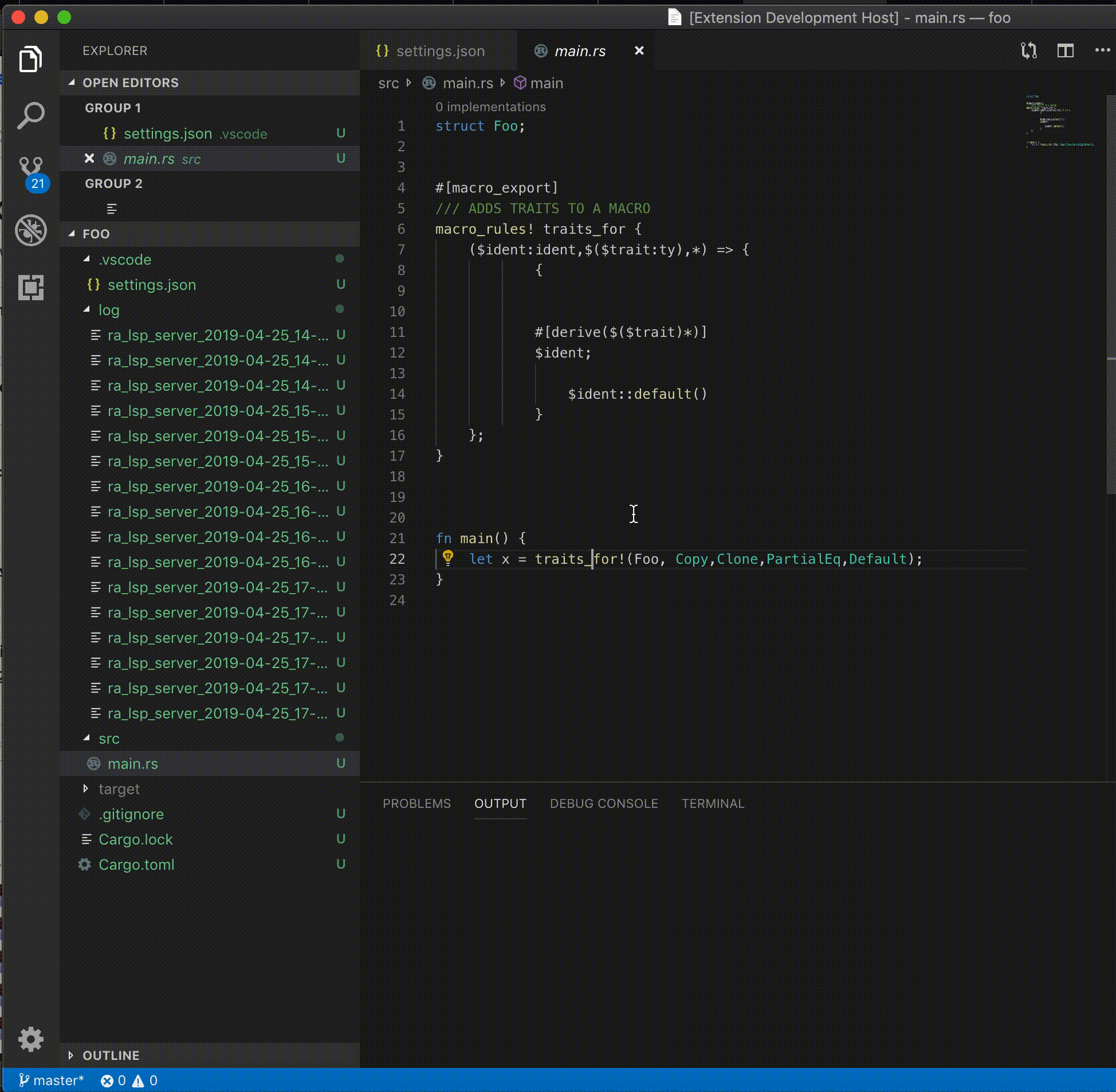2628: Add macro 2.0 support in parser r=matklad a=edwin0cheng
This PR added a new syntax kind : `MACRO_DEF` and a keyword `MACRO_KW`
there are two syntax for declarative macro 2.0 :
1. Normal : `macro m { ($i:ident) => {} }` , which handle similar to legacy one.
2. Call like: `macro m($i:ident) {}`, it produces a single token tree which have two child token trees : `($i:ident)` and `{}`
Co-authored-by: Edwin Cheng <edwin0cheng@gmail.com>
Although structs and unions have the same syntax and differ only in
the keyword, re-using the single syntax node for both of them leads to
confusion in practice, and propagates further down the hir in an
upleasent way.
Moreover, static and consts also share syntax, but we use different
nodes for them.
2343: implement assist invert_if r=matklad a=bravomikekilo
fix [issue 2219 invert if condition](https://github.com/rust-analyzer/rust-analyzer/issues/2219)
I put the assist cursor range to `if` of the if expression, because both condition and body will be replaced. Is there any way to replace them without cover the cursor position?
@matklad
Co-authored-by: bravomikekilo <bmk1221@126.com>
The current system with AstIds has two primaraly drawbacks:
* It is possible to manufacture IDs out of thin air.
For example, it's possible to create IDs for items which are not
considered in CrateDefMap due to cfg. Or it is possible to mixup
structs and unions, because they share ID space.
* Getting the ID of a parent requires a secondary index.
Instead, the plan is to pursue the more traditional approach, where
each items stores the id of the parent declaration. This makes
`FromSource` more awkward, but also more correct: now, to get from an
AST to HIR, we first do this recursively for the parent item, and the
just search the children of the parent for the matching def
Right now they are handled in `postfix_dot_expr`, but that doesn't allow it to
correctly handle precedence. Integrate it more tightly with the Pratt parser
instead.
Also includes a drive-by fix for parsing `match .. {}`.
Fixes#2242.
2149: Handle IfLet in convert_to_guarded_return. r=matklad a=krk
Fixes https://github.com/rust-analyzer/rust-analyzer/issues/2124
I could not move the cursor position out of `let`:
`le<|>t` vs `let<|>`.
Also, please suggest extra test cases.
Co-authored-by: krk <keremkat@gmail.com>
Whitespace can have special meaning in markdown. For instance
ending a line with three spaces will render a new line.
Note that this behavior diverges from RLS.
Fixes#1997
1951: Lower the precedence of the `as` operator. r=matklad a=goffrie
Previously, the `as` operator was being parsed like a postfix expression, and
therefore being given the highest possible precedence. That caused it to bind
more tightly than prefix operators, which it should not. Instead, parse it
somewhat like a normal binary expression with some special-casing.
Fixes#1851.
Co-authored-by: Geoffry Song <goffrie@gmail.com>
1928: Support `#[cfg(..)]` r=matklad a=oxalica
This PR implement `#[cfg(..)]` conditional compilation. It read default cfg options from `rustc --print cfg` with also hard-coded `test` and `debug_assertion` enabled.
Front-end settings are **not** included in this PR.
There is also a known issue that inner control attributes are totally ignored. I think it is **not** a part of `cfg` and create a separated issue for it. #1949Fixes#1920
Related: #1073
Co-authored-by: uHOOCCOOHu <hooccooh1896@gmail.com>
Co-authored-by: oxalica <oxalicc@pm.me>
Forbidding block expressions entirely is too strict; instead, we should only
forbid them in contexts where we are parsing an optional RHS (i.e. the RHS of a
range expression).
Previously, the `as` operator was being parsed like a postfix expression, and
therefore being given the highest possible precedence. That caused it to bind
more tightly than prefix operators, which it should not. Instead, parse it
somewhat like a normal binary expression with some special-casing.
1815: Support correct `$crate` expansion in macros r=uHOOCCOOHu a=uHOOCCOOHu
This PR makes normal use cases of `$crate` from macros work as expected.
It makes more macros from `std` work. Type inference works well with `panic`, `unimplemented`, `format`, and maybe more.
Sadly that `vec![1, 2, 3]` still not works, but it is not longer an issue about macro.
Screenshot:

Co-authored-by: uHOOCCOOHu <hooccooh1896@gmail.com>
1848: Parse `..` as a full pattern r=matklad a=ecstatic-morse
Resolves#1479.
This PR implements [RFC 2707](https://github.com/rust-lang/rfcs/pull/2707) in the parser. It introduces a new `DotDotPat` AST node modeled on `PlaceholderPat` and changes the parsing of tuple and slice patterns to conform to the RFC.
Notably, this PR does *not* change the resulting AST when `..` appears in a struct pattern (e.g. `Struct { a, b: c, .. }`). I *think* this is the behavior mandated by RFC 2707, but someone should confirm this.
Co-authored-by: Dylan MacKenzie <ecstaticmorse@gmail.com>
1743: Support `#[macro_use]` on `extern crate` r=matklad a=uHOOCCOOHu
Unfortunately, #1688 is still an issue. My guess is wrong :(
Co-authored-by: uHOOCCOOHu <hooccooh1896@gmail.com>
1734: Strip indents and empty lines in check_apply_diagnostic_fix_from_position r=matklad a=matklad
Co-authored-by: Phil Ellison <phil.j.ellison@gmail.com>
1721: Impl/dyn trait r=flodiebold a=flodiebold
This adds support for `impl Trait` and `dyn Trait` types as far as possible without Chalk. So we can represent them in the type system, and handle them in method resolution, but Chalk doesn't know about them yet. There's a small temporary hack here where we bypass Chalk during method resolution, so we can handle simple method calls on them and completion works.
Fixes#1608.
1723: Make sysroot use `RUST_SRC_PATH` if set r=matklad a=bkchr
Co-authored-by: Florian Diebold <flodiebold@gmail.com>
Co-authored-by: Bastian Köcher <git@kchr.de>
- refactor bounds handling in the AST a bit
- add HIR for bounds
- add `Ty::Dyn` and `Ty::Opaque` variants and lower `dyn Trait` / `impl Trait`
syntax to them
1661: Parse function parameters attributes r=matklad a=eupn
Fixes#1397. The [RFC-2565](https://github.com/rust-lang/rfcs/blob/master/text/2565-formal-function-parameter-attributes.md) specifies `#[attributes]` to function parameters:
```rust
fn foo(#[attr] a, #[unused] b, #[must_use] ...) {
// ...
}
```
This PR adds those attributes into grammar and to the parser, extending corresponding inline tests.
Co-authored-by: Evgenii P <eupn@protonmail.com>
1562: Continue support for .await r=matklad a=unrealhoang
- add await expr to ast and HIR Expr
- infer type for `.await`
Co-authored-by: Unreal Hoang <unrealhoang@gmail.com>
* make stuff more type-safe by using `BindPat` instead of just `Pat`
* don't add `mut` into binding hash
* reset shadow counter when we enter a function
This wasn't a right decision in the first place, the feature flag was
broken in the last rustfmt release, and syntax highlighting of imports
is more important anyway
Array members are allow to have attributes such as `#[cfg]`.
This is a bit tricky as we don't know if the first expression is an
initializer or a member until we encounter a `;`. This reuses a trick
from `stmt` where we remember if we saw an attribute and then raise an
error if the first expression ends up being an initializer.
This isn't perfect as the error isn't correctly located on the attribute
or initializer; it ends up immediately after the `;`.
Very simple approach: For each identifier, set the hash of the range
where it's defined as its 'id' and use it in the VSCode extension to
generate unique colors.
Thus, the generated colors are per-file. They are also quite fragile,
and I'm not entirely sure why. Looks like we need to make sure the
same ranges aren't overwritten by a later request?
1208: [WIP] Goto for Macro's r=matklad a=Lapz
Adds goto definition for macros. Currently only works for macros in the current crate ~~otherwise it panics~~. Proper macro resolution needs to be added for it to resolve macros in other crates.
Todo
- [X] Allow goto from macro calls
- [X] Fix panics
- [x] Add tests

Co-authored-by: Lenard Pratt <l3np27@gmail.com>
1213: Make lexer produce only single character puncts r=matklad a=edwin0cheng
As discussed in Zulip, this PR change `lexer` to produce only single char punct.
* Remove producing `DOTDOTDOT, DOTDOTEQ, DOTDOT, COLONCOLON, EQEQ, FAT_ARROW, NEQ, THIN_ARROW` in lexer.
* Add required code in parser to make sure everythings works fine.
* Change some tests (Mainly because the `ast::token_tree` is different)
Note: i think the use of `COLON` in rust is too overloaded :)
Co-authored-by: Edwin Cheng <edwin0cheng@gmail.com>
E.g. in
```
let foo = 1u32;
if true {
<|>foo;
}
```
the hover shows `()`, the type of the whole if expression, instead of the more
sensible `u32`. The reason for this was that the search for an expression was
slightly left-biased: When on the edge between two tokens, it first looked at
all ancestors of the left token and then of the right token. Instead merge the
ancestors in ascending order, so that we get the smaller of the two possible
expressions.